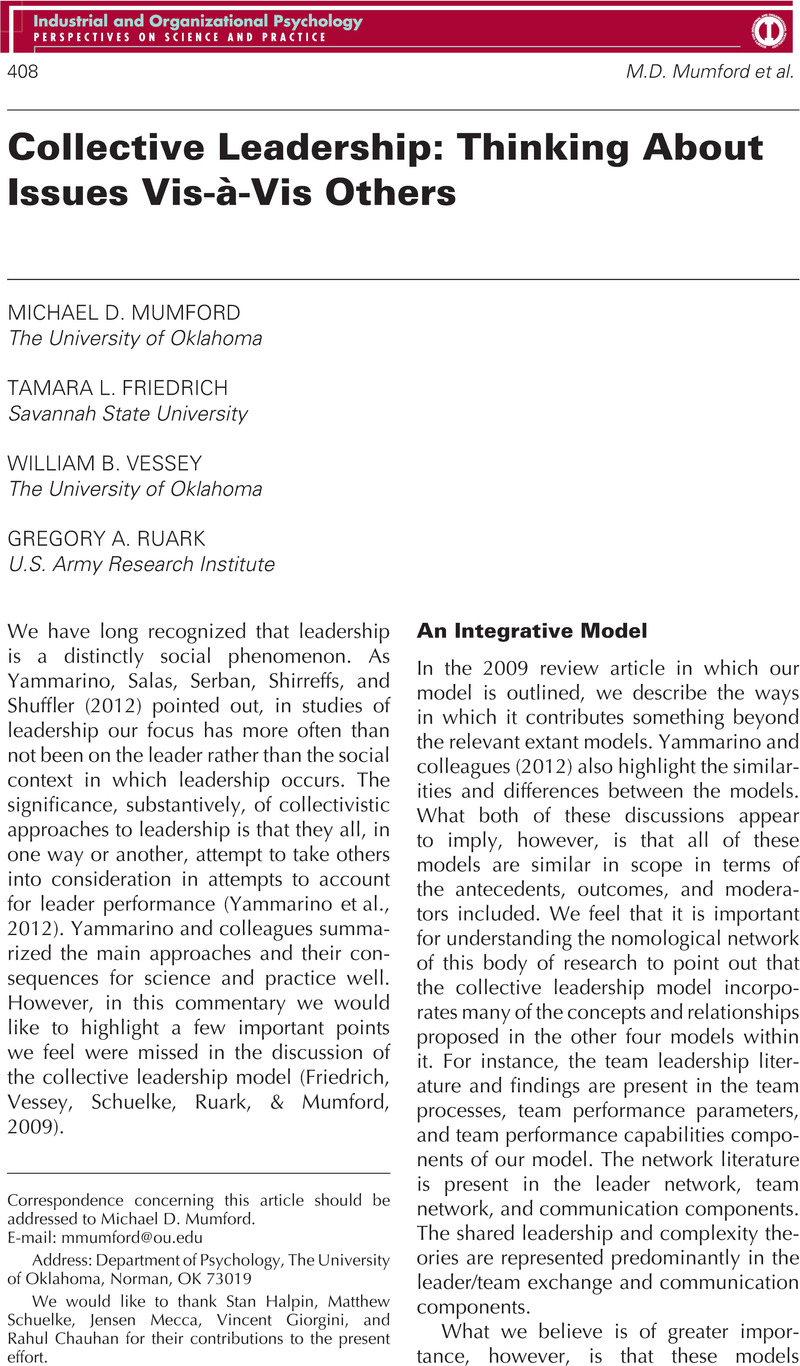Crossref Citations
This article has been cited by the following publications. This list is generated based on data provided by Crossref.
Shuffler, Marissa L.
Salas, Eduardo
Yammarino, Francis J.
Serban, Andra
and
Shirreffs, Kristie
2012.
Putting the “We” in Leadership: Continuing the Dialogue to Advance Our Science and Practice.
Industrial and Organizational Psychology,
Vol. 5,
Issue. 4,
p.
437.
Kriger, Mark
and
Zhovtobryukh, Yuriy
2013.
Rethinking strategic leadership: stars, clans, teams and networks.
Journal of Strategy and Management,
Vol. 6,
Issue. 4,
p.
411.
Friedrich, Tamara L.
Vessey, William B.
Schuelke, Matthew J.
Mumford, Michael D.
Yammarino, Francis J.
and
Ruark, Gregory A.
2014.
Collectivistic leadership and George C. Marshall: A historiometric analysis of career events.
The Leadership Quarterly,
Vol. 25,
Issue. 3,
p.
449.
Pearce, Craig L.
Wassenaar, Christina L.
and
Manz, Charles C.
2014.
Is Shared Leadership the Key to Responsible Leadership?.
Academy of Management Perspectives,
Vol. 28,
Issue. 3,
p.
275.
Yammarino, Francis J.
Mumford, Michael D.
Connelly, M. Shane
Day, Eric Anthony
Gibson, Carter
McIntosh, Tristan
and
Mulhearn, Tyler
2015.
Team Cohesion: Advances in Psychological Theory, Methods and Practice.
Vol. 17,
Issue. ,
p.
213.
Mulhearn, Tyler
McIntosh, Tristan
Gibson, Carter
Mumford, Michael D.
Yammarino, Francis J.
Connelly, Shane
Day, Eric Anthony
and
Vessey, Brandon
2016.
Leadership for long-duration space missions: A shift toward a collective approach.
Acta Astronautica,
Vol. 129,
Issue. ,
p.
466.
Friedrich, Tamara L.
Griffith, Jennifer A.
and
Mumford, Michael D.
2016.
Collective leadership behaviors: Evaluating the leader, team network, and problem situation characteristics that influence their use.
The Leadership Quarterly,
Vol. 27,
Issue. 2,
p.
312.
White, Leroy
Currie, Graeme
and
Lockett, Andy
2016.
Pluralized leadership in complex organizations: Exploring the cross network effects between formal and informal leadership relations.
The Leadership Quarterly,
Vol. 27,
Issue. 2,
p.
280.
Chen, Qian
and
Liu, Zhiying
2018.
How does TMT transactive memory system drive innovation ambidexterity?.
Chinese Management Studies,
Vol. 12,
Issue. 1,
p.
125.
Boak, George
and
Crabbe, Sarah
2019.
Evaluating the impact of coaching skills training on individual and corporate behaviour.
European Journal of Training and Development,
Vol. 43,
Issue. 1/2,
p.
153.
DeSisto, Marco
Cavanagh, Jillian
and
Bartram, Timothy
2019.
Bushfire investigations in Australia.
Leadership & Organization Development Journal,
Vol. 41,
Issue. 2,
p.
177.
Becker, Laura
2019.
Kooperative Dienstleistungen.
p.
229.
Kramer, Michael W
Day, Eric Anthony
Nguyen, Christopher
Hoelscher, Carrisa S
and
Cooper, Olivia D
2019.
Leadership in an interorganizational collaboration: A qualitative study of a statewide interagency taskforce.
Human Relations,
Vol. 72,
Issue. 2,
p.
397.
Eva, Nathan
Wolfram Cox, Julie
Tse, Herman H.M.
and
Lowe, Kevin B.
2019.
From competency to conversation: A multi-perspective approach to collective leadership development.
The Leadership Quarterly,
p.
101346.
Spiller, Chellie
Maunganui Wolfgramm, Rachel
Henry, Ella
and
Pouwhare, Robert
2020.
Paradigm warriors: Advancing a radical ecosystems view of collective leadership from an Indigenous Māori perspective.
Human Relations,
Vol. 73,
Issue. 4,
p.
516.
Cepiku, Denita
and
Mastrodascio, Marco
2020.
Leadership and performance in intermunicipal networks.
Journal of Public Budgeting, Accounting & Financial Management,
Vol. 32,
Issue. 2,
p.
177.
Barry, Erin S
Bader-Larsen, Karlen S
Meyer, Holly S
Durning, Steven J
and
Varpio, Lara
2021.
Leadership and Followership in Military Interprofessional Health Care Teams.
Military Medicine,
Vol. 186,
Issue. Supplement_3,
p.
7.
Cepiku, Denita
and
Mastrodascio, Marco
2021.
Leadership behaviours in local government networks: an empirical replication study.
Public Management Review,
Vol. 23,
Issue. 3,
p.
354.
Oh, Junyoung
Lee, Hwansoo
and
Zo, Hangjung
2021.
The Effect of Leadership and Teamwork on ISD Project Success.
Journal of Computer Information Systems,
Vol. 61,
Issue. 1,
p.
87.
Nguyen, Thi Phuong Linh
Nguyen, Thu Thuy
Duong, Cong Doanh
and
Doan, Xuan Hau
2022.
The effects of transformational leadership on employee creativity in Vietnam telecommunications enterprises.
Management Decision,
Vol. 60,
Issue. 3,
p.
837.





